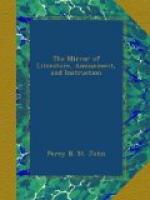After one such compliment, it would be almost the same as ask you for another, if I shall make apology in case I have not find the correct ideotism of your language in this letter; so I shall not make none at all,—only throw myself at your mercy, like a great critic. But never mind,—we shall see. If you take this letter as it ought, I shall not promise if I would not write you one other some time.
I conclude by presenting at you my compliments very respectful. I am sorry for your gout and crutchedness, and hope you shall miss them in the spring.
I have the honour of subscribe myself,
Sir,
Your very humble and
Much obedient
servant,
LOUIS
LE CHEMINANT.
P.S.—Ha, ha!—It is very droll!—I tell my valet, we go at Leicestershire for the hunting fox.—Very well.—So soon as I finish this letter, he come and demand what I shall leave behind in orders for some presents, to give what people will come at my lodgments for Christmas Boxes.
* * * * *
RETROSPECTIVE GLEANINGS.
* * * * *
ANTIQUITY OF THE ALDERMAN.
Alderman is derived from the Saxon word ealderman, that is a senior or alderman, which by degrees came to stand for persons of great distinction, because such were chosen to discharge the highest offices, being those whose long experience rendered them most capable, and whose birth and fortunes made them most conspicuous; and as they were generally entrusted with the government of the counties, instead of saying the governor, it was said the ealderman of such a county. While the heptarchy lasted, these offices were only during the king’s pleasure; at last they became during life. After the Danes were settled in England, the title of ealderman was changed into that of earl, and the Normans introduced that of count, which, though different in its original signification, meant, however, the same dignity. There were several sorts of ealdermen; some were properly only governors of a province or county, others were owners of their province, holding it as a fee of the crown. These ealdermen, or earls, were honoured with titles of reguli subreguli, principes, patricii, and some times rex.




